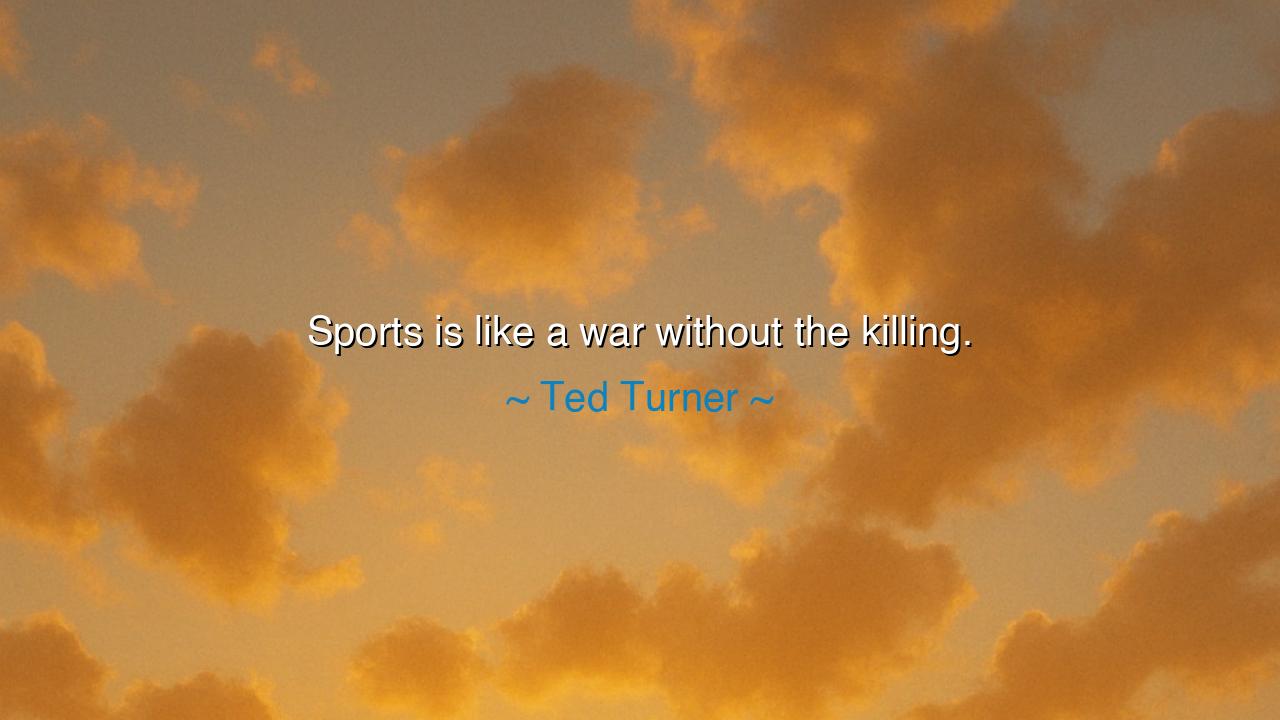
Sports is like a war without the killing.






Ted Turner, the fiery pioneer of modern media and patron of great contests, once declared: “Sports is like a war without the killing.” These words strike the heart like a drum of battle, for they reveal that within the bounds of sports lies the very essence of conflict: struggle, strategy, discipline, and sacrifice—yet tempered, purified, and made noble by the absence of death. Turner’s saying is not a glorification of war, but a recognition that sport gives humanity a way to confront its own combative nature without the ruin of bloodshed.
The meaning of this saying lies in the recognition that competition is woven into the human spirit. Nations have risen and fallen on the fields of war, but the same fire that drives armies also drives athletes. Both demand courage in the face of fear, preparation in the face of uncertainty, and resilience in the face of defeat. Yet where war leaves behind scars of hatred and graves of the fallen, sport offers renewal—after the whistle blows and the contest ends, foes may clasp hands, rivals may embrace, and what was once conflict becomes respect.
History confirms this truth. Consider the tale of the Olympic Truce in ancient Greece. When the games were held in Olympia, wars ceased, and enemies laid down their arms so that athletes might gather in peace. In the stadium, the spirit of war lived on in contests of speed, strength, and skill—but without the killing. It was a recognition that the thrill of combat could be honored, while sparing the destruction of lives and nations. Thus, sport became the civilized descendant of battle, a way to honor courage without spilling blood.
Even in modern times, sport has echoed the drama of war. The World Cup of 1950, where underdog Uruguay defeated mighty Brazil before a stunned crowd, was called a “battle without guns.” The strategies of coaches mirror the strategies of generals, the formations of players resemble the ranks of soldiers, and the tension of fans recalls the fervor of armies awaiting victory. Yet when the contest ends, the battlefield is left whole, and the warriors live to fight another day. Turner’s words remind us that sport carries the same intensity, but with a far more sacred outcome: life preserved.
But his saying also carries a warning. For if sport is like war, it can also awaken the darker passions of pride, violence, and hatred. Crowds can become mobs, rivalry can turn to enmity, and contests meant to unite can divide. Thus, the wisdom of Turner’s quote lies not only in recognizing the parallel, but in urging us to cherish the difference. The greatness of sport is not in how much it resembles war, but in how it transforms war’s fury into something life-giving, something that inspires courage without destruction.
The lesson, then, is clear: let sports be your battlefield, not life itself. Wage your wars in the arena, with honor and with respect, and leave your weapons at the gate. Let your rival be your teacher, not your enemy, and let your struggle uplift rather than destroy. For in the end, sport is humanity’s answer to its own violent nature: the creation of a sacred space where we may fight without hatred, strive without killing, and discover greatness without ruin.
So I say to you: carry Turner’s wisdom with you. When you play, play as if it is war—fierce, disciplined, unyielding. But when the game is over, leave the battlefield in peace, knowing that the true purpose of sport is not conquest, but fellowship. For in this way, sport becomes more than a game—it becomes the proof that mankind can transform its oldest instinct, the instinct to fight, into a path not of death, but of life, joy, and unity.






AAdministratorAdministrator
Welcome, honored guests. Please leave a comment, we will respond soon